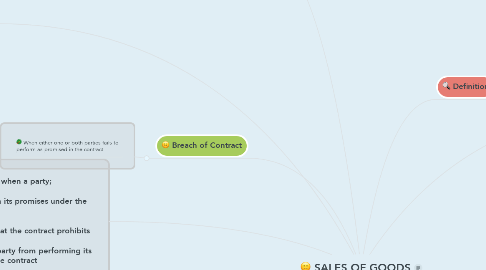
1. A breach may occur when a party; - Refuses to perform its promises under the contract - Does something that the contract prohibits Prevents the other party from performing its obligations under the contract
2. Tham Cheow Toh v Associated Metal Smelters Ltd: Where there was a breach of express condition by the appellant, the respondent could decide to waive it and choose to treat the breach as a breach of warranty, thereby allowing him to carry on with the contract and only claim for damages.
3. Remedy for breach of condition
3.1. Sec. 13(1): Buyer may elect to treat the breach of condition as a breach of warranty.
3.2. Sec. 13(2): A breach of condition must be treated as a breach of warranty where: - The contract is not severable and the buyer has accepted the goods or part thereof
4. Breach of Contract
4.1. When either one or both parties fails to perform as promised in the contract.
5. Rights of Unpaid Seller
5.1. Sec 45(1) of the SGA 1957: Seller is defined as "unpaid seller" when - whole of the price has not been paid - bill of exchange or other negotiable instruments are received as conditional payment, and the condition on which it should be received has not been fulfilled
5.2. Sec 46(1) of SGA 1957: Even if property in goods have been passed to buyer, unpaid seller, by implication of law, entitled to - lien on the goods despite buyer is in possession of goods - cases of insolvency of the buyer after the transfer of goods, seller has rights to stop the goods in transit - a right of resale
6. Sec. 4(3): Sale is where the property in the goods is transferred from seller to buyer. Agreement to sell is where the transfer of the property in the goods is to take place at a future time or subject to a condition to be fulfilled.
7. Definition
7.1. Sec. 4(1): Contract of sale of goods is where the seller transfers or agrees to transfer the property in goods to the buyer for a price.
7.2. Sec. 2: Price is money consideration for a sale of goods
7.3. Sec. 4(4): Agreement to sell becomes a sale when the time elapses or the conditions are fulfilled subject to which the property in the goods is to be transferred.
8. Types of goods
8.1. Sec. 2: Goods are: Every kind of movable property other than money claims
8.2. Sec. 6(1): Goods may either be existing goods or future goods. - Existing goods: Goods that are owned or possessed by the seller at the time of the contract.
8.2.1. Existing of goods can be divided into; - Specific goods: Goods identified and agreed upon at the time a contract of sale is made. - Unascertained goods: Existing goods not yet identified and agreed upon at the time the contract of sale is made. -
8.3. Future goods
8.3.1. Sec 2(6) Goods to be manufactured or produced or acquired by the seller after the making of the contract of sale; goods not yet in existence. Sec. 6(3): In a contract of sale for future goods, the contract will operate as an agreement to sell the goods. - Specific goods can also be future goods.
8.3.1.1. Example: you have an apple orchard with apples in it. You agree to sell 1000 apples to buyer after the apple ripe. This is a sale that has to occur in the future but the goods have been identified already and the agreement made.
